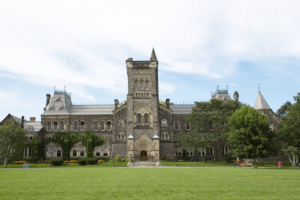Several top-ranked universities offer local and international students to pursue a Masters In Microbiology In Canada. This course program teaches students about the vast world of microorganisms and microbes. Microbiology majors study bacteria, viruses, fungi, yeasts, and algae. Graduates in this field can pursue various careers, such as employment in a research laboratory, medical office, or science-writing career.
Leap Advantage Virtual Spot Offer Event on May 10th 2024

Last call to secure your spot for Masters in US for Fall ’24 Intake
Leap Advantage Virtual Spot Offer Event on May 10th 2024
Last call to secure your spot for Masters in US for Fall ’24 Intake

Best Universities to Study Masters In Microbiology In Canada
The following Canadian universities offer a Master’s Degree In Microbiology at impeccable standards.
| University Name | Qualifying Exam Scores | Course Fee (in CAD) |
|---|---|---|
| The University of British Columbia | • PTE – Cut off not mentioned • TOEFL – 100 • IELTS – 6.5 in each category | 27,255 |
| McGill University | • PTE – Cut off not mentioned • TOEFL – 86 • IELTS – 6.5 | 30,861 |
| University of Victoria | • PTE – Cut off not mentioned • TOEFL – Cut off not mentioned • IELTS – 6.5 | 5,118 |
| Dalhousie University | • PTE – Cut off not mentioned • TOEFL – Cut off not mentioned • IELTS – 7.5 | 16,552 |
| University of Ottawa | • PTE – Cut off not mentioned • TOEFL – Cut off not mentioned • IELTS – 7 | 25,210 |
| University of Saskatchewan | • PTE – Cut off not mentioned • TOEFL – Cut off not mentioned • IELTS – 6.5 | 8,010 |
The University of British Columbia
Details of the university and course are described in the table below.
| Particulars | Highlights |
|---|---|
| Course Name | Master of Science in Microbiology & Immunology |
| University Type | Public |
| Year of Establishment | 1908 |
| Course Level | PG Degree |
| Duration | 2 years |
| Fees | 27,255 CAD |
Entry requirements for the course are as follows –
- Applicants must hold a minimum score of 65% in the undergraduate course
- Or, candidates should possess a 4-year Bachelor’s degree with first-division marks or a CGPA of 8 on a 10-point grading system in food science or relevant subjects
- Further, applicants possess a Bachelor’s degree in any of the following subject areas –
- Engineering
- Forestry
- Medicine
- Applicants must secure a minimum of 25 marks in reading and listening and 21 marks in writing and speaking sections in TOEFL
- Candidates have to maintain a score of 6.5 throughout each subset of IELTS
Check Your Eligibility for 80+ Universities across Canada

Book a free counselling session and find universities where you can get an Admission!
Check Your Eligibility for 80+ Universities across Canada
Book a free counselling session and find universities where you can get an Admission!

McGill University
Details of the University and course are described in the table below.
| Particulars | Highlights |
|---|---|
| Course Name | Master of Science (M.Sc.) Microbiology & Immunology |
| University Type | Public |
| Year of Establishment | 1821 |
| Course Level | PG Degree |
| Duration | 1 year |
| Fees | 30,861 CAD |
Entry requirements for the course are as follows –
- Applicants should hold a 4-years Bachelor’s degree with a CGPA of 3.2 in relevant subject areas. Apart from that, other qualification norms include –
- 3-year Bachelor’s degree from an A-rated institution under NAAC
- A 2-year master’s degree with a 3-year Bachelor’s degree from an institution rated below A by NAAC
- Candidates are not required to have a heavy background in microbiology and immunology studies
- Applicants with a BSc. Honours in the related field of study
- Candidates must secure at least 20 marks in each component of the TOEFL
- Applicants must maintain a minimum score of 6.5 on the IELTS exam
| Particulars | Highlights |
|---|---|
| Course Name | MSc in Microbiology |
| University Type | Public |
| Year of Establishment | 1908 |
| Course Level | PG Degree |
| Duration | 2 to 3 years |
| Fees | 5,118 CAD |
University of Victoria
Entry requirements for the course are as follows –
- Applicants must secure 60% marks or a CGPA of 7 out of 10 in a 4-year Bachelor’s degree
- Candidates with equivalent qualifications from a certified university must secure a B+ average in the last two years of academic study
- Further, they must have completed an undergraduate with a background in biochemistry and microbiology
- Individuals must secure a minimum of 6.0 in each component of IELTS
Dalhousie University
Details of the university and course are described in the table below.
| Particulars | Highlights |
|---|---|
| Course Name | MSc in Microbiology & Immunology |
| University Type | Public |
| Year of Establishment | 1818 |
| Course Level | PG Degree |
| Duration | 2 to 3 years |
| Fees | 16,552 CAD |
Entry requirements for the course are as follows –
- Applicants must hold a 4-years Bachelor’s degree from a certified university
- Must maintain an average CGPA of 3.3 in the graduation program
- Further, students must secure a 7.5 on the IELTS exam
University of Ottawa
Details of the university and course are described in the table below.
| Particulars | Highlights |
|---|---|
| Course Name | Master of Science in Microbiology & Immunology |
| University Type | Public |
| Year of Establishment | Year of Establishment |
| Course Level | PG Degree |
| Duration | 12 months |
| Fees | 25,210 CAD |
Entry requirements for the course are as follows –
- Applicants must have completed their Bachelor’s of sciences with a minimum score of 75%
- Candidates must demonstrate excellent academic performance throughout their previous qualifications. They must present the transcripts and reports to showcase their research skills
- Applicants must maintain a minimum score of 7 in each component of the IELTS
University of Saskatchewan
Details of the university and course are described in the table below.
| Particulars | Highlights |
|---|---|
| Course Name | MSc in Applied Microbiology |
| University Type | Public |
| Year of Establishment | 1907 |
| Course Level | PG Degree |
| Duration | 2 years |
| Fees | 8,010 CAD |
Entry requirements for the course are as follows –
- Applicants must hold a 4-years undergraduate completion certificate from a certified university in the proposed field of study
- Further, candidates must secure a cumulative grade average of 70%, equivalent to the USask grading system in 60 credit units or the last two years of the previous qualification
- Must hold scores of a minimum of 6 in each section of the IELTS test
This program, Masters In Microbiology In Canada, is designed for students and recent graduates who want to pursue careers. Areas of research range from the ecology, evolution and environments of microorganisms to the diseases they cause and the microbiome and its influence on the immune system and our health.
The Masters In Microbiology In Canada programs are research-based, and students can objectively synthesise information from scientific literature into a thesis, conduct research using state-of-the-art equipment, and learn experimental designs and fundamental research techniques.
Frequently Asked Questions
1. How much do Microbiologists make in Canada?
The average annual salary of a microbiologist in Canada is around 100,897 CAD. An entry-level microbiologist’s yearly average salary is 61,319 CAD, and with experience, it can increase to 461,006 CAD per year.
2. Are Microbiologists in demand?
It is estimated that the job prospect of microbiologists will grow by 5 per cent from 2020 to 2030, a bit slower than the usual growth rate of other occupations. Still, a skilled microbiologist is in high demand from various reputed MNCs and organisations involved in the health sector.
3. Is a Microbiologist a Scientist?
A microbiologist can be termed a scientist. They deal with the study of microscopic organisms and processes. Further, this comes with various specialisations in their growth and interactions. It includes organisms like bacteria, algae, fungi, parasites and vectors.






